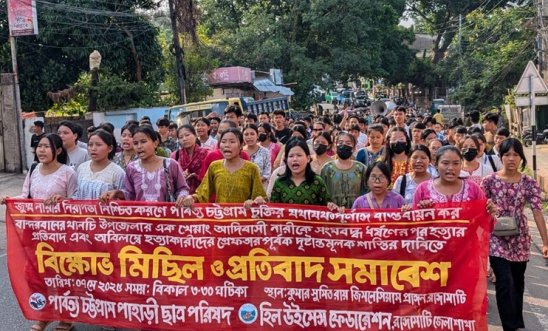
Indigenous Khyang woman raped and murdered

Written by Jerry Allen, Country Coordinator for Sri Lanka and Bangladesh
On 5th May 2025, an indigenous Khyang woman named Chingma (29) was gang-raped and murdered in the Thanchi area off the Chittagong Hills Tracts (CHT) of Bangladesh. Chingma was the mother of three children. According to confirmed reports her body was found with injury marks, eyes gouged out and covered in blood.
Chingma went to work in the hillside fields (the Jum) at around 7 am as usual. When she didn’t return the villagers went searching for her. At that time, there were reports of something being dragged in the Jum fields. Her body was found at around 3 pm. On the previous day she had seen three Bengali road construction workers on the way and went home and reported it because she was scared.
This type of incident is typical of many attacks over the years as is the subsequent lack of action by the police. This case is important as it has incited considerable anger among the indigenous people of Bangladesh. It is particularly important to my family.
The Chittagong Hill Tracts in southeast Bangladesh are home to eleven indigenous nations. I lived there for a year. The Khyang are the smallest and probably the most endangered nation. At the time of partition (1947), indigenous people were 95% of the population, now they are less than 50%. This migration has been associated with land grabbing and violence. People from the lowlands are often moved overnight to the land of indigenous people with a very different culture.
According to the Chittagong Hill Tracts Commission, an independent advocacy NGO, in cases where indigenous women report rape by Bengali settlers, doctors are pressured by the authorities to report no evidence of rape, arguing that a finding of rape would contribute to tensions between Indigenous Peoples and Bengalis. “Impunity has been the single most important factor contributing to increased incidents of sexual and gender- based violence in the CHT. The biases of the administrative, political and judicial systems prevent access to equality and justice by Indigenous Peoples and minorities.”
The women of the CHT work in the Jum fields during the day. I can remember visiting remote villages where the children play happily alone all day. But when the police investigated Chingma’s case they were suspicious as to why a woman was out working alone. The cultural misunderstanding hinders investigation.
The situation for women and minorities in Bangladesh has deteriorated recently. There have been more attacks on indigenous people over the last year.
On 3rd May this year, thousands of male supporters of Hefazat-e-Islam, a hard-line, religious collective with sympathisers in the interim government, held a huge rally in Dhaka to express their anger at the recommendations of the Women's Affairs Reform Commission. "Men and women can never be equal” said the leader of a women's madrassa. Participants were seen striking a hanging representation of a woman with their shoes.
This case is important to me because my wife is Khyang. Chingma is the sister of my wife’s adopted daughter Mary. Mary was adopted because her parents and another sister were killed in previous attacks in the Thanchi area. The photo of Chingma with her child was taken during a visit to my wife. At that time my wife warner her of the settler road workers. When I first visited my wife’s family, as soon as a I sat, the smiling Mary would miraculously put a cup of chai in front of me. Mary, my wife and all Khyang people are extremely upset.
This incident has generated considerable anger among the indigenous people. There have been large protests in Bandarban, Rangamatti, Chittagong and by student groups in Dhaka.
Usiching Khyang, of the Khyang Students Union, "As all these incidents are not properly investigated, there have been recurring incidents of rape and murder."
The years of impunity for rapists is cause of the anger. Already the police seem reluctant to properly investigate. The local police chief talks of “the mystery of this incident” seemingly unable to understand the role of women in the culture.
It is difficult being a Country Coordinator when human rights incidents are so close to one’s family and when the focus of our work is on a limited set of priorities. Please can activists remember the areas of the world where racism prevails, where women are not safe, where land is being grabbed and where culture is being threatened.
https://www.tbsnews.net/bangladesh/women-student-orgs-protest-gang-rape…
Our blogs are written by Amnesty International staff, volunteers and other interested individuals, to encourage debate around human rights issues. They do not necessarily represent the views of Amnesty International.
0 comments